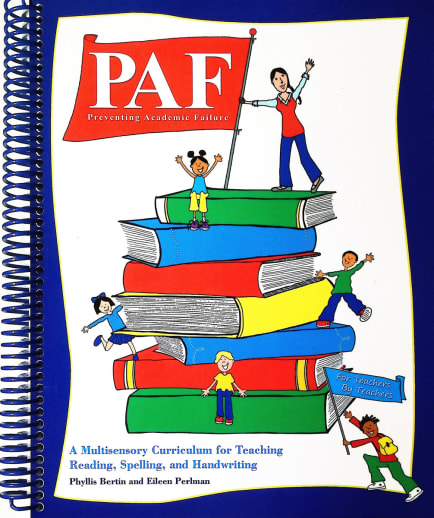At the heart of this multisensory, Orton-Gillingham method program is the Preventing Academic Failure (PAF) Teacher's Handbook. This manual contains the methodology and framework for the entire program, integrating reading, spelling and handwriting instruction and has been updated to include the PAF Readers. The program is based on the premise that language learning moves from simple to complex (phonics-based). Children learn individual letter sounds, then build syllables, words and sentences as they progress. The program uses a multisensory approach to accomplish this. Students learn to recognize graphic symbols for letters and sounds (visual), differentiate and duplicate sounds (auditory and vocal), and write symbols to produce sounds and words (kinesthetic). Instruction is organized and systematic with plenty of practice and reinforcement. This is much more than phonetic instruction as it addresses all components of language structure: phonograms, sight words, spelling rules, syllabication and grammatical concepts. There are 215 levels (or lessons) in the program.
Preventing Academic Failure Teacher's Handbook
Description
The Preventing Academic Failure (PAF) Teacher's Handbook is a detailed guide for using the PAF program. It is necessary in order to properly implement the program. The Teacher's Handbook is well organized to ensure success for both teacher and students. Contains over 200 lessons that can be used in conjunction with the Merrill Linguistic Reading Program, Explode The Code, and Megawords.
Features include clearly written, step-by-step instructions for teaching reading, spelling, and handwriting using multisensory techniques, a sequence of over 200 lessons coordinated with the Merrill Readers, assessment tests to monitor progress, lists of vocabulary for reading and spelling lessons, and explanations of how the English language works.
About PAF Series: This early intervention program for reading, spelling, and handwriting addresses reading failure in learning disabled and struggling readers. PAF is based on the latest scientific research and it has been proven successful in over 40 years of use.
At the heart of this multisensory Orton-Gillingham method program is the Preventing Academic Failure (PAF) Teacher's Handbook. This handbook has been updated to incorporate the PAF readers. It contains the methodology and framework for the entire program, integrating reading, spelling/dictation, grammar and handwriting instruction. The Teacher's Handbook includes a complete explanation of the program and how to teach it, a Curriculum Sequence of the order of instruction, lesson plan templates, proficiency tests, and an appendix (which includes comprehensive instruction on how to teach handwriting). The Curriculum Sequence part of the handbook lists when to use the other components of the program including PAF Handwriting, Alphabet Picture Cards, Pocket Chart Alphabet Cards, Review Cards, Key Word Picture Cards, and the PAF Reading Series including the Skills Books and Teacher's Guides. Levels 161-215 still use the Merrill Readers Take Flight and Break Through along with the Stepping Up In Reading 3 Workbook. (For a more specific review of the reading and handwriting components, please see PAF Readers and PAF Handwriting Program.)
The program is based on the premise that language learning must be simple to complex (phonics-based). Children should learn individual letter sounds, building syllables, words and sentences as they progress. The program uses a multisensory approach to accomplish this. Students learn to recognize graphic symbols for letters and sounds (visual), differentiate and duplicate sounds (auditory and vocal), and write symbols to produce sounds and words (kinesthetic). Children are explicitly taught phonics which is then reinforced in reading, spelling, handwriting and grammar. Instruction is organized and systematic with plenty of practice and reinforcement. This is much more than phonetic instruction as it addresses all components of language structure: phonograms, sight words, spelling rules, syllabication and grammatical concepts. There are 215 levels (or lessons) in the program.
This is a very thorough, complete and sound phonics-based language program which requires very little advance knowledge or preparation on the part of the teacher. It integrates phonics, reading, handwriting, spelling and grammar. The cost is reasonable. It can be used for three years (K-3) of phonics/reading/spelling instruction, or used as a remedial program for older students.
| Product Format: | Softcover Book |
|---|---|
| Grades: | PK-AD |
| Brand: | Preventing Academic Failure |
| ISBN: | 9780838852712 |
| Length in Inches: | 11 |
| Width in Inches: | 9.25 |
| Height in Inches: | 1 |
| Weight in Pounds: | 1.6 |

